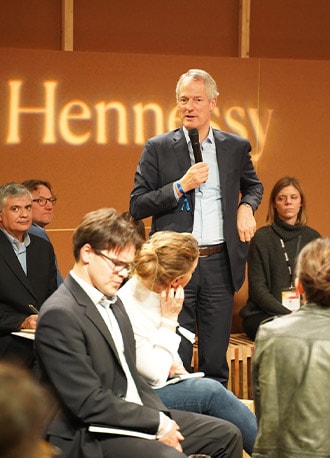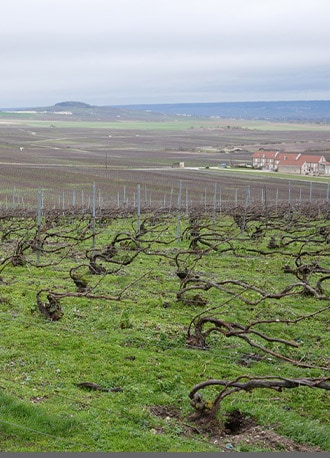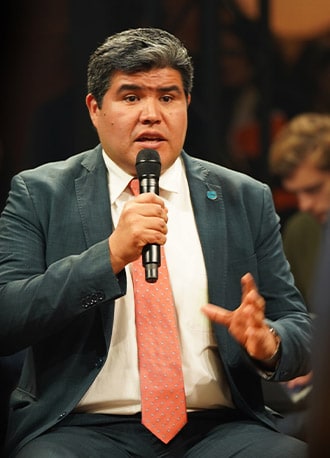COMPANY MENU
SPECIAL COLUMN

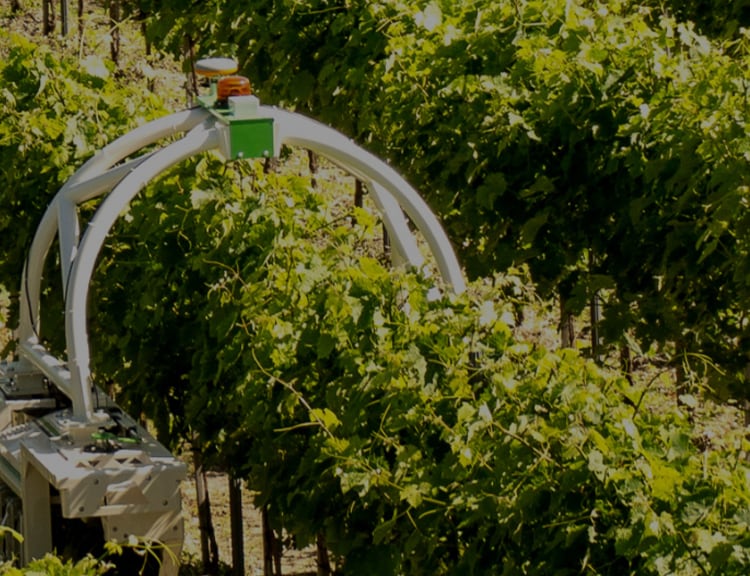
LIVING SOILS
- In recent years, our planet has been experiencing change on a global scale. This includes everything from massive natural disasters like typhoons and hurricanes, to droughts that result in wildfires. And we cannot ignore the damage such disasters bring to the wine and spirits industry. Wildfires have burned vineyard fields in California and Australia, while the smoke they produce negatively affects the scent of the wine.
- Global temperatures have been on the rise since the start of the 21st century, causing the grape harvesting season in many regions to come earlier each year. This means that grape varieties suited to the soil of a certain region may not grow there so easily 100 years from now.
- The main cause of these environmental changes is thought to be an increase in greenhouse gases—the result of destructive decisions made by humankind.
Moët Hennessy holds a symposium in Paris
The themes are the environment and a sustainable future
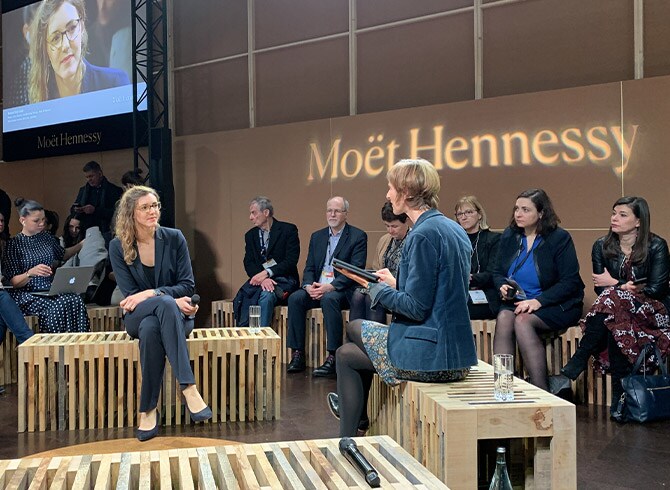
Although there were a few confirmed cases of COVID-19 in France by February 10, 2020 no one yet imagined the state that Europe would soon be in. It is at this time that Moët Hennessy hosted a symposium entitled “Living Soils” over the three days of Vinexpo Paris, a wine and spirits trade show held in Paris.
This symposium demonstrated to those both within and outside the industry that winemaking leader Moët Hennessy is combating the environmental issues facing wine and spirits head-on and actively working to realize a sustainable future. Panelists included management and winemakers from the Moët Hennessy Group, as well as researchers, journalists, and sommeliers from around the world.
The panelists held active discussions at Moët Hennessy’s booth. At the entrance of this large space was a display featuring Moët & Chandon’s electric tractor and the self-propelled weeding robot currently being tested at Hennessy. The walls surrounding the booth were made from recycled cork, and the benches on which the panelists and visitors sat were repurposed from barrel wood originally used to age wine and cognac.
The vineyards of the Champagne region: Herbicide-free by the end of 2020
EUR 20 mill. invested in researching sustainable viticulture
This symposium is the result of efforts made by Philippe Schaus, President and CEO of Moët Hennessy, who opened the event with a declaration: “Through Living Soils, Moët Hennessy aims to connect communities around the world and develop a global social responsibility program.” Quoting Louis Pasteur’s “A bottle of wine contains more philosophy than all the books in the world,” he then went on to stress the importance of addressing challenges to protecting “living soils.” These include climate change, soil conservation, securing and conserving water, and supply chain sustainability.
Schaus also announced that all vineyards owned by Moët Hennessy-affiliated Champagne houses will completely stop using herbicides by the end of 2020, as well as stating the group’s intentions to fund sustainable viticulture research by investing EUR 20 million (approx. JPY 2.4 billion) in a research center in Champagne, and their plans for a “University of Living Soils” which will advance the sharing of knowledge and practices.
Discussions covering a variety of themes were held over the three days of the symposium. The following are some of the most interesting.
“Living soil” is like nothing else
Respect for nature is paramount
Professor Lydia Chabala of the University of Zambia spoke on the topic “How to protect and regenerate our most precious resource, the soil.” According to Chabala, “Wine and food are all thanks to the soil. The presence of microorganisms living in the soil is significant, and living soils are those which have microorganisms in them.” Dr. Ronald Vargas, executive director of the Global Partnership on Soils at the United Nations, also discussed this topic. He warned that “it is far more expensive to regenerate soil once it is contaminated than to protect it from contamination.” He also added, “Mindfulness of soil health and respect for nature is paramount.”
Romain Le Guillou, Vineyards and Grape Supply Director at Veuve Clicquot, followed their words with three reasons why “living soil is like nothing else”: First off, all life comes from the soil. Secondly, soil is a heritage which should be passed down from generation to generation. Third, the AOC (appellation d'origine contrôlée: “controlled designation of origin”) should reflect the terroir, something in which soil plays a large part. It is therefore necessary that winemakers place particular focus on soil in order to express the unique characteristic of their wines and Champagne.

A wine journalist who has worked in the industry for 30 years. He started out working for a wine magazine before becoming an independent writer in 1997. In addition to working with wine magazines, he also writes articles on wine for lifestyle magazines. Yanagi is a Chevalier of the Ordre des Coteaux de Champagne, and a Commander of Honor of the Commanderie du Bontemps.
As a global leader in Luxury Wine & Spirits with many iconic Maisons, we have a special responsibility towards our
stakeholders and the planet as a whole. Our original founders strived to be responsible actors. It is our mission to nurture
this heritage by ensuring that people and nature partner together to get the best from the earth and give back to it. Soils,
as a complex ecosystem, are one of earth's most precious resources and a source of prosperity for Moët Hennessy.
The soils of our terroirs, the know-how of our people and the excellence of our products are closely interwoven. But our
commitment goes far beyond soil and terroir. Because taking care of nature is ultimately about taking care of people,
it is also our role to support communities and bring positive change to society. It's about Living Together as one.
Diageo global is also committed to implementing CSR activities in three areas:
Reducing our environmental impact, Promoting positive drinking, and Building thriving communities.
 Armand De Brignac
Armand De Brignac Dom Pérignon
Dom Pérignon Krug
Krug Moët & Chandon
Moët & Chandon Ruinart
Ruinart Veuve Clicquot
Veuve Clicquot Chandon
Chandon Château d’Esclans
Château d’Esclans Château Galoupet
Château Galoupet Château Minuty
Château Minuty Cloudy Bay
Cloudy Bay Joseph Phelps
Joseph Phelps Newton
Newton Numanthia
Numanthia Skyside
Skyside Taylor's
Taylor's Terrazas De Los Andes
Terrazas De Los Andes Ardbeg
Ardbeg Belvedere
Belvedere Glenmorangie
Glenmorangie Hennessy
Hennessy Old Parr
Old Parr Royal Household
Royal Household Talisker
Talisker SIRDAVIS
SIRDAVIS Volcán de mi Tierra
Volcán de mi Tierra WhistlePig
WhistlePig